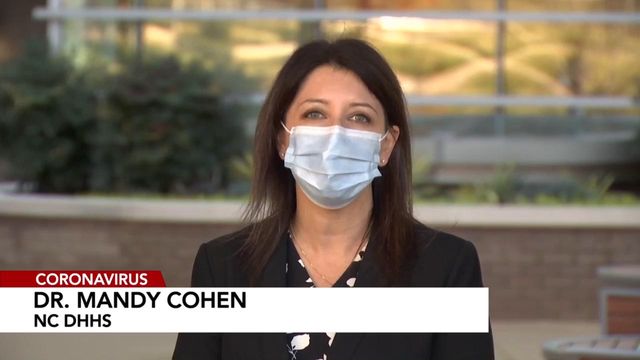Despite travel warning, many in NC are flying, gathering for Christmas
Despite the rising number of coronavirus cases and the pleas of public health leaders, many North Carolinians are traveling this week.
Early Wednesday morning, two days before Christmas, Raleigh-Durham International Airport was already busy. RDU is anticipating about 104,200 travelers for Christmas week, or about one-third the number who traveled through the airport last year.
The busiest travel days are projected to be the two Sundays after Christmas -- Dec. 27 and Jan. 3 -- with more than 18,400 travelers expected each day.
On Tuesday, Gov. Roy Cooper urged North Carolinians not to travel as COVID-19 hospitalizations in the state reach record numbers. When WRAL News asked Cooper if travel restrictions are coming, he said he hopes the restrictions already in place will help avoid that.
In a recent survey, nearly 10,000 people said they traveled or gathered with people outside their household at Thanksgiving. Currently, North Carolina has no travel restrictions in place, but other states have taken it up a notch. New York and Alaska are threatening up to $25,000 fines for some travelers not quarantining.
Health researchers across North Carolina surveying people about coronavirus guidelines have found that a lot of them aren't listening to warnings not to travel or gather. If you choose to gather anyway, N.C. Health and Human Services Secretary Dr. Mandy Cohen said, wear a mask, keep a distance from others and get a coronavirus test.
Multiple sites in Wake County are offering free drive-thru coronavirus testing Christmas week and the week after. Keep in mind that a negative COVID-19 test doesn't guarantee you won't become sick or infect other people.
Why are people gathering against health officials' advice? People at RDU on Monday said family is the No. 1 reason.
"His grandma lives here in town. This is his Christmas present. That’s all he wanted, so that’s what we decided to do," said Emily Cohoon, who flew to the Triangle with her 5-year-old son, Zeke, from Illinois.
Cohoon is a nurse, so she's very familiar with pandemic protocols.
"We’re already so exposed, so we take the precautions," she said. "I wear a mask. He wears his. We have lots of hand sanitizer on us."
Among North Carolinians, many aren't being so careful. Out of 20,000 people who signed up for a survey with the COVID-19 Community Research Partnership, half said they traveled or gathered with people outside their household at Thanksgiving.
Among those, only 51 percent said they observed social distancing guidelines, only 37 percent said they wore masks and just 13 percent got tested for the virus beforehand.
The survey, conducted by WakeMed, Campbell University, Vidant Health in Greenville, New Hanover Regional Medical Center in Wilmington, Wake Forest Baptist Health in Winston-Salem and Atrium Health in Charlotte, also found that younger people were more likely than older people to disregard the health guidance. White respondents were more likely to get together with people outside their households than people in the Black and Latino communities, according to the survey.
Ashley Rubio and her family went to RDU on Monday to pick up a cousin and her family flying in from Houston.
"They made the decision; we didn’t," Rubio said. "We’re just trying to take as much precautions as we can."
Austin Strickler said he wasn’t able to fly home to Salt Lake City last year because he was deployed to Korea. He said he wasn't worried about the virus.
"I think that we’ve gotten it quite handled, compared to what it was in the earlier stages," Strickler said.
Last week, North Carolina reported the highest number of new coronavirus infections in a single week since the pandemic began. The state also has set numerous one-day records for new cases and hospitalizations in recent weeks.
Marco Sardela, a health care worker who was on his way to Illinois to see his parents, said he wasn't worried about infecting them.
"I was able to get the vaccine, [and] I was able to get tested," Sardela said. "They get tested very regularly since they work for the university, so I think we’re at a pretty low risk."
Health experts said getting the first dose of coronavirus vaccine doesn't offer full protection against the virus. People need to get both doses and then wait a week or two for maximum protection, they said.














